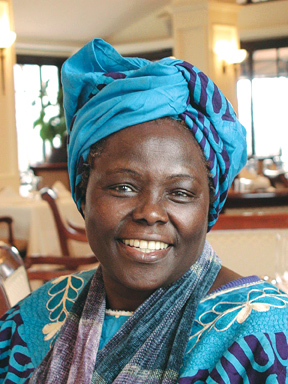





The Nobel laureates supporting the statement are:
-- Betty Williams and Mairead Corrigan Maguire, founders of the Peace People in Northern Ireland and winners of the Nobel Peace Prize in 1976;
-- Rigoberta Menchu Tum, a leading advocate of ethno-cultural reconciliation in her native Guatemala and Nobel winner in 1992;
-- Professor Jody Williams, international campaigner for the banning of land mines, winner in 1997;
-- Iranian human rights lawyer Dr. Shirin Ebadi, winner in 2003;
-- Kenyan environmental activist Professor Wangari Muta Maathai, Nobel winner in 2004.
-----------------------------------------------------------------------------------------------
(19 June 2008, BWNS) The Baha’i International Community has learned that on 3 June, Mrs. Mahvash Sabet and Mrs. Fariba Kamalabadi were permitted to make short phone calls to their families. Mrs. Sabet had been detained in Mashhad on 5 March but on 26 May was transferred to Evin Prison in Tehran, where it is believed the others are also being held.
Later it was confirmed that Mr. Jamaloddin Khanjani, Mr. Afif Naeimi, Mr. Saeid Rezaie, Mr. Behrouz Tavakkoli, and Mr. Vahid Tizfahm also have made brief phone calls to their families.
No charges have been filed against any of the seven, who comprise the entire membership of a coordinating committee that saw to the minimal needs of the 300,000-member Baha’i community of Iran.
---------------------------------------------------------------------------------------------...25 years on from the Shiraz hangings, Shahla Davarpanah is anxiously concerned about the safety of the seven Bahá’í leaders in Iran, recently arrested in dawn raids ominously similar to the events of the early 1980s when some 200 Bahá’ís were killed for their faith. “These events bring back all the memories,” said Mrs Davarpanah. “It’s hard to believe it’s still happening.”
But she senses that the people of Iran have changed since the events of 1983. “They know more than before. They have been told lies for so long and now can see that the Bahá’ís are not what the authorities say they are.”
Along with the worldwide Bahá’í community and countless other friends and supporters, Mrs Davarpanah is praying that the persecution of Bahá’ís in Iran will soon end. “I hope that the Bahá’ís in Iran will soon have the freedom to be able to live their lives in peace,” she said, “and that others will see the reality of what they truly stand for.”--------------------------
by Ahmad Batebi
04-Sep-2008
...Without doubt, the problem of the Islamic regime with the Bahai Faith is based in ideology. However, the question is: Why is the Shiite sect ruling over the people of Iran, despite the fact that the Bahai Faith believes and respects the foundation of all other religions, especially Islam, is solely attacking the Bahais when other religious minorities, such as the Christians, the Jews or the Zoroastrians are not under similar pressure? From the perspective of this writer, the Shiite persecution has two reasons:
* The appearance of this religion after Islam, as the last divine religion, which according to their belief, is sent by Almighty God for the salvation of the world of humanity.
* The close proximity of certain teachings of the Bahai Faith to key beliefs of the governmental authorities, such as the phenomenon of the Lord of the Age, or the doctrine of Mahdaviyat, or eschatological views.(8) The authorities firmly believe that these issues are the foremost foundation of the divine legitimacy of the Islamic regime, while simultaneously they are also the largest differences between this sect (namely, the Shiites) and all other sects of Islam.
....From another direction this question can be raised: Are individual Muslims exempt from the duty to study, contemplate and decide on the validity or the falsehood of claims to Qaimiyyat? Or has God, His traditions, divine teachings and Islamic law left this matter exclusively for the inquiry of religious leaders and the jurists of the age?
In accordance with Shi‘i jurisprudence, is every Muslim not duty bound to first consider the claim of every claimant with his own eyes, mind and discernment, and to look for the right signs and evidences, and only afterwards, in case it is needed, to consult with ecclesiastics and ask for their views? Is each and every Muslim not obligated to carefully consider, read and assess with his own mind the writings of such claimants to Qaimiyyat, and only then, if necessary, to consult with others, perhaps even ranking clerics?
Based on what principle or judgment should Muslims make their beliefs, or disbeliefs, the same, and dependent on the views of religious clerics and mullahs? Every Muslim has the spiritual and religious duty to fully investigate the truth or the falsehood of the claim to Qaimiyyat by himself. The right to come to a conclusion regarding the genuineness or fabrication of a claim to the Qaimiyyat by its various claimants belongs to all people.





Комментариев нет:
Отправить комментарий